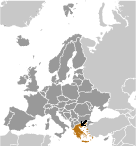World Atlas: Greece. On this page you can see the map, country flag and many detailed information about the people, history and economy of Greece.

Here you can find online selected information about the geography, inhabitants, government, economy and history of Greece. Included are selected statistics, an overview map and the detailed map of Greece. But let's start with the flag of Greece here:
Greece - Overview:
What you should know about Greece? Let's start with this: Greece achieved independence from the Ottoman Empire in 1830. During the second half of the 19th century and the first half of the 20th century, it gradually added neighboring islands and territories, most with Greek-speaking populations. In World War II, Greece was first invaded by Italy (1940) and subsequently occupied by Germany (1941-44); fighting endured in a protracted civil war between supporters of the king and other anti-communist and communist rebels. Following the latter's defeat in 1949, Greece joined NATO in 1952. In 1967, a group of military officers seized power, establishing a military dictatorship that suspended many political liberties and forced the king to flee the country. In 1974 following the collapse of the dictatorship, democratic elections and a referendum created a parliamentary republic and abolished the monarchy. In 1981, Greece joined the EC (now the EU); it became the 12th member of the European Economic and Monetary Union (EMU) in 2001. Greece has suffered a severe economic crisis since late 2009, due to nearly a decade of chronic overspending and structural rigidities. Since 2010, Greece has entered three bailout agreements with the European Commission, the European Central Bank (ECB), the IMF, and with the third, the European Stability Mechanism (ESM). The Greek Government agreed to its current, $96 billion bailout in August 2015, which will conclude in August 2018.
Geography of Greece
 Where on the globe is Greece? The location of this country is Southern Europe, bordering the Aegean Sea, Ionian Sea, and the Mediterranean Sea, between Albania and Turkey. Total area of Greece is 131,957 sq km, of which 130,647 sq km is land. So this is not a large country. How could we describe the terrain of the country? This way: mountainous with ranges extending into the sea as peninsulas or chains of islands. The lowest point of Greece is Mediterranean Sea 0 m, the highest point Mount Olympus 2,917 m. And the climate is temperate; mild, wet winters; hot, dry summers.
Where on the globe is Greece? The location of this country is Southern Europe, bordering the Aegean Sea, Ionian Sea, and the Mediterranean Sea, between Albania and Turkey. Total area of Greece is 131,957 sq km, of which 130,647 sq km is land. So this is not a large country. How could we describe the terrain of the country? This way: mountainous with ranges extending into the sea as peninsulas or chains of islands. The lowest point of Greece is Mediterranean Sea 0 m, the highest point Mount Olympus 2,917 m. And the climate is temperate; mild, wet winters; hot, dry summers.
Inhabitants of Greece
Let's take a look how many people live in Greece. The number is: 10,768,477 (July 2017 est.). So this is not very populous country. Who lives here? population: Greek 93%, other (foreign citizens) 7% (2001 census). What are the languages in Greece? Greek (official) 99%, other (includes English and French) 1%. And the religions: Greek Orthodox (official) 98%, Muslim 1.3%, other 0.7%. How old are the people in average? 44.5 years. We have to add that this number is the median - so one half of the people is older than this, one half is younger. And what is their life expectancy (at birth)? This: 80.7 years. Where the people live in Greece? Here: one-third of the population lives in and around metropolitan Athens; the remainder of the country has moderate population density mixed with sizeable urban clusters. The major urban areas of Greece are: Athens (capital) 3.052 million (2015).
Government and Economy of Greece
The capital of Greece is Athens and the government type parliamentary republic. Let's take a look at the administrative divisions - 13 regions (perifereies, singular - perifereia) and 1 autonomous monastic state (aftonomi monastiki politeia); Agion Oros (Mount Athos), Anatoliki Makedonia kai Thraki (East Macedonia and Thrace), Attiki (Attica), Dytiki Ellada (West Greece), Dytiki Makedonia (West Macedonia), Ionia Nisia (Ionian Islands), Ipeiros (Epirus), Kentriki Makedonia (Central Macedonia), Kriti (Crete), Notio Aigaio (South Aegean), Peloponnisos (Peloponnese), Sterea Ellada (Central Greece), Thessalia (Thessaly), Voreio Aigaio (North Aegean). Regarding the economy of Greece, important industrial products are tourism, food and tobacco processing, textiles, chemicals, metal products; mining, petroleum. Important agricultural products are wheat, corn, barley, sugar beets, olives, tomatoes, wine, tobacco, potatoes; beef, dairy products. The most important export commodities are food and beverages, manufactured goods, petroleum products, chemicals, textiles and the most important export partners are Italy 11.2%, Germany 7.7%, Cyprus 6.4%, Turkey 5.3%, Bulgaria 5.2%, US 4.3%, UK 4.2%, Lebanon 4.1% (2016). The most important import commodities are machinery, transport equipment, fuels, chemicals and the most important import partners are Germany 11.1%, Italy 8.8%, China 6.6%, Russia 6.4%, Netherlands 5.5%, Iraq 5.4%, France 4.4%, South Korea 4.1% (2016). How rich is Greece and how rich are people in this country? The most important number here is GDP per capita (PPP): $27,800 (2017 est.). This means the living standards are good here. Let's add that this means Gross Domestic Product per person, which is recalculated with respect to the relative cost of local goods and services. And one more important number - population below poverty line: 36% (2014 est.).